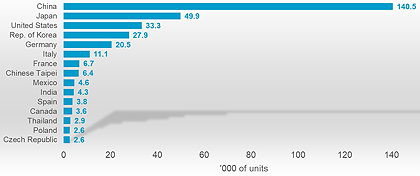UK robot sales fell by 16% in 2019, but its base grew by 5%

Sales of industrial robots in the UK fell by 16% last year compared to 2018, with around 2,000 machines being shipped. The total number of robots in use in the country grew by 5% to 21,700. These figures come from the World Robotics 2020 Industrial Robots report just published by the International Federation of Robotics (IFR).
“The United Kingdom has a surprisingly low robot stock for a Western European country in the manufacturing industry,” says IFR president, Milton Guerry. “Though the UK’s operational stock hit a new record, other European countries like France, Italy and Germany have between two times and even ten times, the stock in operation. The automotive and the general industry need to invest in automation technology to keep up with international competition.”
The automotive sector is by far the largest user of industrial robots in the UK, with around 11,000 machines, accounting for more than half (52%) of the country’s total operating stock at the end of 2019, The second-largest user of industrial robots was the plastics and chemical industry with 2,710 machines, representing 13% of the total operational stock.
Even before the arrival of the Coronavirus, investments in the UK were being dampened by the unclear Brexit situation, says the IFR. If no trade agreement is reached between the UK and the EU by the end of this year, the UK will be treated like a third-party country by the EU, it adds. This uncertainty is inhibiting the modernisation of production facilities.

The IFR suggests that the uncertainty will also determine the speed of economic recovery after the pandemic. However Brexit might accelerate robot installations in the UK because immigrants from Eastern Europe are returning to their home countries and the UK government policy is to restrict immigration. These immigrants often worked in low-wage jobs, particularly in the food industry and other manufacturing jobs, and might not be easily replaced by human labour in times of low unemployment.
When the UK economy recovers and labour becomes a scarce resource again, the demand for robots might start to rise, the IFR predicts.





